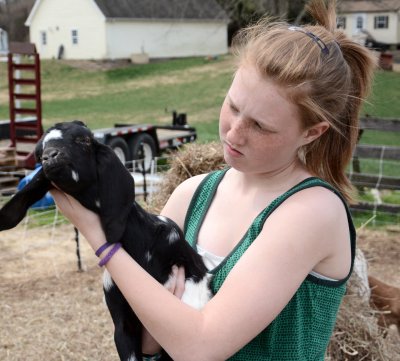
Jacqueline Bowen, 14, who helps run the Green Goats business with her mother Mary, holds a baby goat. Jacqueline is in charge of naming every goat born to the family's herd, and says every name is a reflection of each goat's personality. (Photo: Patrick Farrell)
SUNDERLAND, Md. (May 1, 2014)—Have you herd? Goats will soon be making their way through Maryland and Northern Virginia, as property owners trade machinery and labor crews for hungry, four-legged landscapers ready to decimate any vegetation in their way.
Mary Bowen, owner of Sunderland-based Green Goats and Prosperity Acres farm, will be putting her herd of over 70 goats to work from May to October, using them to clear overgrown vegetation in various private and public areas across the state.
Unlike traditional land-clearing methods such as herbicide treatments and excavation services, which can have adverse effects on the environment, goats offer an environmentally-friendly alternative.
Poison ivy, poison oak and poison sumac are some of the goats’ favorite vegetation choices, making the animals perfect for jobs with highly concentrated areas of poisonous plants that humans wouldn’t dare tackle themselves.
Bowen founded Green Goats three years ago, with the intention of providing a service that would benefit both the environment and the state.
For years the Bowen family had been showing goats, along with cattle and horses, at local 4-H shows around the state, including the Anne Arundel County Fair in Crownsville and the Maryland State Fair in Timonium.
“I wanted to be able to do something with the goats other than showing them … I actually wanted to utilize them to do what they naturally do, which is forage,” Bowen said.
After linking up with Enrique Escobar, a small ruminant specialist and assistant professor at the University of Maryland, Eastern Shore, Bowen was able to make her plan a reality.
During a workshop in which Escobar recounted past experiences with using goats for land clearing projects in Oklahoma, Bowen saw the potential in bringing the practices to Maryland.
“I decided I wanted to be able to develop this business, because I had heard in other states, particularly California, where they use the goats to clear out for firebreaks in the park services … and that was what I really wanted to be able to start doing,” Bowen said. “Something that is good for our community … good for our state.”
Bowen noted that when using goats, there is no need to dispose of debris, no pollution from machinery, and no need to acquire land clearing permits that might be required for a traditional excavation crew. In addition, the goats provide free fertilizer over the course of their stay.
“Sometimes you have to use herbicides ... there’s just no other way to get around it, I understand that,” she said, “but if we can reduce the amount of herbicides that are used to almost nothing, thats what I prefer - and the goats can obliterate any job we’ve put them on so far.”
Brian Knox, owner of Eco-Goats, based in Davidsonville, uses his herd to run a vegetation control and land clearing business much like that of the Bowen’s.
As a natural resource consultant, and the president of Sustainable Resource Management Inc., Knox first got started with his business after one of his clients mentioned that they were looking for a way to put their livestock to use.
Knox says what followed was an “experiment that was wildly successful”—one that would eventually take over his summers as a full-time business, and according to Knox, the popularity of these businesses is on the rise.
Knox said he has consulted goat owners from all over the country, including Indiana, Oregon, and Pennsylvania, to aid farmers in their efforts to establish similar businesses.
Goats eat up to 20 percent of their body weight each day, and the length of each project depends on the size of the property and the amount of vegetation - both of which also help dictate how many goats Bowen will allot to the job.
Bowen currently runs the business with her two children, Jacqueline, 14, and Jacob, 12, who assist with caring for the goats and setting up each job - which is fairly simple, as Bowen only needs to fence in the goats, provide water, and leave the animals to take care of the rest.
In the past, the goats have worked on a variety of projects ranging anywhere from historic sites to golf courses, including Mellomar Golf Park in Owings.
In October, nearing the end of last years work season, the Green Goats made news after uncovering what were thought to be eight lost gravesites at St. Ignatius Cemetery in Port Tobacco.
With publicity surrounding goats on the rise, both Bowen and Knox are anticipating a busy summer.
“I certainly am seeing a lot of inquires this year from all over the place,” Knox said. “I usually get some, but right now it seems that there is way more interest than past years.”
“To most people, goats are pretty cool!”


